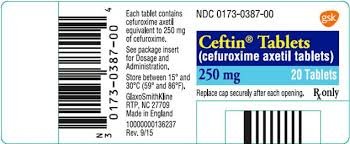
Introduction:
In the realm of antibiotics, Ceftin stands as a stalwart defender against bacterial infections. This article delves into the depths of Ceftin, exploring its uses, dosage, potential side effects, and more, to equip you with knowledge essential for navigating healthcare decisions.
What is Ceftin?
Ceftin, also known by its generic name cefuroxime, belongs to the class of antibiotics called cephalosporins. Cephalosporins are widely used to combat bacterial infections, ranging from mild to severe. Ceftin works by interfering with the bacteria’s cell wall formation, ultimately leading to their destruction.
Uses of Ceftin:
Ceftin finds utility in treating a broad spectrum of bacterial infections, including those affecting the respiratory tract, skin, ears, sinuses, urinary tract, and more. It’s commonly prescribed for conditions such as bronchitis, pneumonia, sinusitis, urinary tract infections, and certain types of skin infections. However, it’s important to note that Ceftin is ineffective against infections caused by viruses, such as the common cold or flu.
Dosage:
The dosage of Ceftin can vary depending on the severity of the infection, the patient’s age, weight, and overall health condition, as well as the specific strain of bacteria causing the infection. Typically, Ceftin is available in tablet form, as well as in oral suspension for pediatric use. The usual dosage for adults is 250 to 500 mg taken orally every 12 hours for 7 to 10 days. For children, the dosage is determined based on their weight and is usually administered in smaller increments.
It’s crucial to follow the prescribed dosage and complete the full course of treatment, even if symptoms improve before the medication is finished. Abruptly stopping the medication can lead to the reemergence of the infection or the development of antibiotic resistance.
Side Effects:
Like any medication, Ceftin may cause side effects in some individuals. Common side effects include nausea, diarrhea, vomiting, stomach pain, headache, dizziness, and vaginal itching or discharge. These side effects are usually mild and temporary, resolving on their own as the body adjusts to the medication.
However, in rare cases, Ceftin can cause more severe side effects that warrant immediate medical attention. These include severe diarrhea (which may be a sign of a Clostridium difficile infection), allergic reactions such as rash, itching, swelling of the face or throat, difficulty breathing, and severe skin reactions like blistering or peeling. If any of these symptoms occur, it’s important to seek medical help promptly.
Precautions and Considerations:
Before taking Ceftin, it’s essential to inform your healthcare provider about any allergies you may have, especially to antibiotics such as penicillin or cephalosporins. Additionally, disclose any other medications, supplements, or herbal remedies you’re currently taking, as they may interact with Ceftin and affect its efficacy or increase the risk of side effects.
Ceftin is generally considered safe for use during pregnancy, but it’s still advisable to consult with a healthcare professional before taking any medication while pregnant or breastfeeding.
It’s also important to complete the full course of Ceftin as prescribed, even if symptoms improve before the medication is finished. Stopping the medication prematurely can contribute to the development of antibiotic resistance, making future infections more difficult to treat.
Conclusion:
Ceftin, a member of the cephalosporin family of antibiotics, is a valuable tool in the fight against bacterial infections. Its broad spectrum of activity, coupled with its relatively low incidence of side effects, makes it a popular choice for healthcare providers treating a variety of bacterial illnesses.
However, like all medications, Ceftin should be used judiciously and under the guidance of a qualified healthcare professional. By understanding its uses, dosage, potential side effects, and precautions, patients can make informed decisions about their healthcare and ensure the most effective and safe treatment possible.
